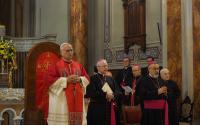 The policy was an attack on Aborigine culture, campaigners say |
26 May 2005
Between 1910 and the 1970s thousands of youngsters were taken from their homes, a policy perceived by many to have been an attempt at cultural assimilation.
An inquiry into the phenomenon in 1997 instituted Sorry Day, to allow Australia to acknowledge its effects.
But Prime Minister John Howard himself has repeatedly refused to apologise.
He says that today's Australians were not responsible for the policies of the past.
Mr Howard's government has, however, expressed regret for the so-called Stolen Generation and committed itself to addressing indigenous disadvantage and reconciliation.
Members of the Stolen Generation have said the experience of being wrenched from their families at an early age has left very deep scars.
They talk of a loss of identity after being brought up by white foster parents or in institutions, oblivious of their indigenous heritage.
Campaigners believe the policy was designed to eradicate Aboriginal culture by severing ties to family and tribal land, as well as destroying language and customs.
They see the Stolen Generation as the victims of a monstrous crime that needs to be formally acknowledged by the government.
 |
An official apology was one of the key recommendations of a report that investigated the forced removal of thousands of Aboriginal children.
It said an apology would help to reconcile the indigenous and non-indigenous communities.
The first National Sorry Day was held in 1998, a year after the report by Australia's Human Rights and Equal Opportunities Commission was released.






